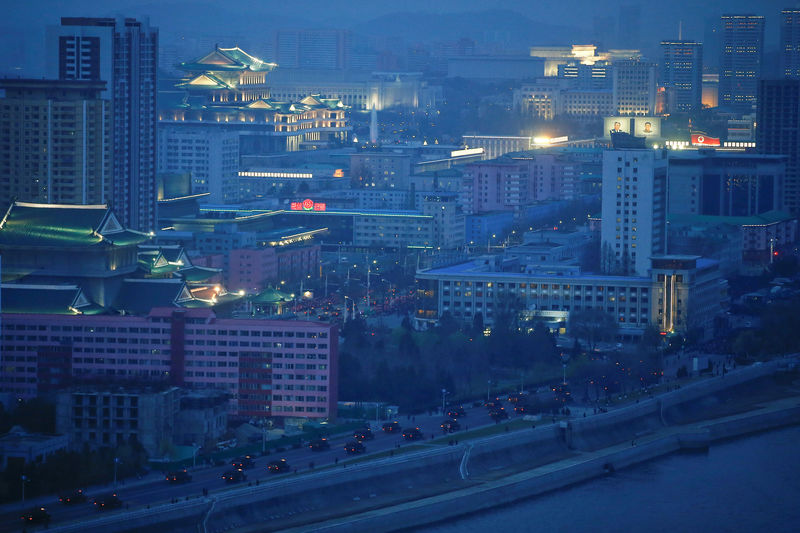By James Pearson (LON:PSON) and Ju-min Park
SEOUL (Reuters) - Some of North Korea's state-run petrol stations are restricting sales or appear to have closed, visitors said on Wednesday, ahead of a U.N. Security Council meeting to discuss tougher sanctions on the isolated state that could include curbs on oil imports.
Nevertheless, diesel and petrol prices quoted by private traders are stable, with supply continuing uninterrupted, according to data compiled by Reuters and interviews with North Korean defectors.
"I've noticed a few (state-owned) gas stations around town that are closed," said Rowan Beard of Young Pioneer Tours, a China-based company that takes Western tourists to North Korea.
"Cars now have a limit of 15 kg (about 20 litres) of fuel. It's been like this for 15 days. Vehicles which are used for work purposes have special exceptions," Beard told Reuters in a message from North Korea.
Another source travelling in the remote northeast area of Rason, who asked not to be named, said that official gasoline prices there had surged or that fuel was being rationed.
But a Reuters analysis of data collected by Daily NK, a website run by defectors who collect prices via phone calls with North Korean fuel traders, said the price of gasoline sold by private dealers in Pyongyang and the northern border cities of Sinuiju and Hyesan had remained relatively stable since late last year at around $1 per kg (about $1.34 per litre).
The price of diesel has averaged at 58 U.S. cents per kg (about 68 cents per litre) as of April 21, compared to 68 cents at the beginning of the year, according to the data.
Fuel is sold by weight in North Korea.
The North Korean government is likely the country's largest consumer of fuel products, but most gasoline and diesel bought by ordinary North Koreans is supplied by private dealers and smugglers, experts say.
U.S. Secretary of State Rex Tillerson will chair a ministerial meeting of the U.N. Security Council on Friday to discuss tougher sanctions on North Korea to deter it from pursuing nuclear and ballistic missiles programmes. U.S. officials have said this could include an oil embargo.
North Korea consumes relatively little oil, but curbing or cutting off its supplies in retaliation for further nuclear or long-range missile tests would be painful and potentially destabilising to the regime of Kim Jong Un.
North Korean domestic fuel prices have surged in the past over fears that sanctions could affect supply. In March 2016, even private fuel prices rose by over 45 percent just before U.N. sanctions were imposed following Pyongyang's fourth nuclear test.
OTHER FACTORS
But there could be other factors at play for the current short supply at government-owned pumps.
Fuel in North Korea is often prioritised for government or military vehicles, especially ahead of national holidays, of which there have been two recently: April 15 to commemorate the birth anniversary of state founder Kim Il Sung, and April 25, the 85th anniversary of the founding of its military.
Prices also tend to rise ahead of the rice planting season, traditionally the first week of May, defectors speaking to sources inside North Korean markets said.
China supplies most of North Korea's fuel needs, with some coming from Russia.
Sources familiar with China's fuel exports to North Korea said there are no signs of China cutting back gasoline shipments, and any petrol rationing could be caused by a shortfall of foreign currency in North Korea as a result of China's coal embargo.
China stopped buying coal from North Korea in February as part of its efforts to implement U.N. sanctions.
"The coal ban is fatal as it should be its top revenue earner, which means they're running short of foreign exchange to buy gasoline," said one source.
China supplies crude oil and diesel under aid programmes to North Korea, but Chinese suppliers normally receive advance hard cash before deliveries of gasoline, said the source.
The stability of market prices, despite the lack of state supply, could also be because North Korea is quietly encouraging fuel smuggling in the fear that an official embargo may be in the works, said Kang Mi-jin, a defector who speaks regularly to market sources inside North Korea and reports commodity prices for Daily NK.
"When there's concern about supplies of fuel or other products, North Korea naturally opens the door to smuggling," said Kang, who spoke to a fuel smuggler by phone on the North Korean-Chinese border on Wednesday.
Kang said none of her sources inside North Korea had reported a significant rise in fuel prices.

For graphic on prices of North Korea's diesel and petrol click on http://tmsnrt.rs/2p3ns3f